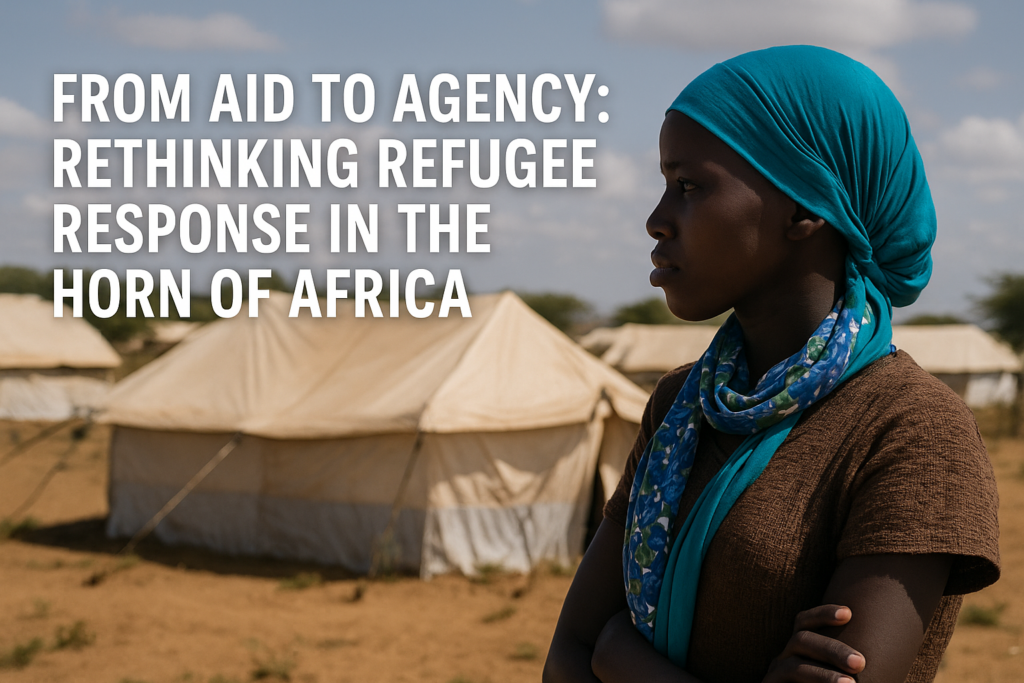
From Aid to Agency: Rethinking Refugee Response in the Horn of Africa » Capital News
By Richie Olaka
As the Horn of Africa faces a worsening crisis of forced displacement, a new approach is urgently needed. Protracted conflicts in Somalia, Ethiopia, South Sudan, and Sudan have driven over 4.5 million people from their homes—many now stuck in long-term displacement across the region.
Having marked World Refugee Day on June 20, the conversation must shift from aid to agency. This means moving beyond short-term humanitarian fixes to embrace long-term development models that empower refugees and the communities that host them. This year’s theme—solidarity with refugees—calls for more than compassion. It demands action: listening to refugees, defending their rights, and creating pathways for their safety and future.
Refugees are not helpless victims. They are resilient individuals with enormous potential. With the right policies and opportunities, they can contribute to host economies and help build stronger societies. Yet for too long, humanitarian responses in the region have sidelined refugees—denying them the right to work, earn a living, or contribute meaningfully.
The refugee crisis, fuelled by instability and prolonged displacement, requires a bold development-oriented strategy.
Development-focused approaches strengthen resilience by enabling refugees to access jobs, start businesses, and participate in local economies. This approach is already gaining momentum.
The Kampala Declaration, signed by IGAD member states, underscores the importance of jobs and self-reliance. In Kenya, the government’s Shirika Plan seeks to transform refugee camps into integrated settlements—blending support for refugees and host communities alike. In Ethiopia, the Jobs Compact, backed by the World Bank, aims to create 100,000 jobs for both groups. Uganda’s model of refugee inclusion is widely regarded as one of the most progressive in the world.
Still, humanitarian frameworks dominate, limiting progress toward real empowerment.
To move forward, governments and stakeholders must embed refugee inclusion into national and county development plans. Refugees must be planned for, not planned around.
The benefits of inclusion are not just moral—they’re economic. Refugees can boost production, stimulate demand, and add value across sectors like agriculture, digital services, and manufacturing.
According to a 2023 World Bank study, every dollar invested in refugee-inclusive development yields up to two dollars in economic returns for host countries. It’s a compelling case for action.
Education is key to unlocking this potential. Equipping refugees with skills—through quality schooling and vocational training—will enable them to access jobs and start businesses. This creates engineers, teachers, health workers, and future leaders.
The private sector must also step up. By partnering with government and civil society, businesses can support refugees through financial inclusion, infrastructure, and service delivery.
Across refugee settlements in Kakuma and Dadaab, thriving refugee-owned businesses show what is possible when agency replaces dependency.
This approach also promotes equity—ensuring that both refugees and host communities benefit. Equity, in turn, fosters harmony and peaceful coexistence.
It is time to abandon the outdated narrative that refugees are a burden. They are agents of change—and must be treated as such.
Empowering refugees requires a radical reimagining of response strategies. It means shifting away from aid dependency and toward self-reliance and inclusion. This is not just an economic shift—it’s a matter of dignity.
Rotary International, founded on promoting peace and goodwill, recognises the power of communities to drive transformation. Rotary Peace Fellows around the world are working to reduce polarisation, promote sustainability, and nurture peace—one individual and one community at a time.
On World Refugee Day, we must redefine what it means to host refugees. It’s not just about opening borders. It’s about opening opportunities.
Let us include refugees in shaping policies that affect them. Let us build systems that give them a stake in their futures. And let us work toward peace—not just the absence of conflict, but the presence of justice, inclusion, and opportunity.
The time to act is now. Let’s move from aid to agency—and in doing so, create a more resilient, equitable future for all.
Richie Olaka is a Rotary Peace Fellow.